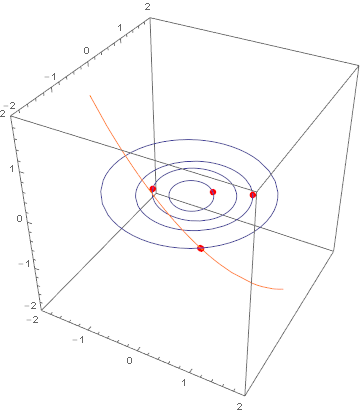This Sunday, October 19th, Comet C/2013 A1 (Siding Spring) will make a very close flyby of Mars. Many of the orbiters and rovers on Mars will hopefully be making some amazing photos of the comet as it passes by. When originally discovered last year, it looked like the comet might impact Mars, but as the orbit was refined, it was found that it would pass within a couple hundred thousand miles of Mars. Close enough that some of the orbiters around Mars are being repositioned to avoid possible impacts from cometary debris during closest approach.
You can query Wolfram|Alpha to see an orbit diagram. Another alternative is to use the Wolfram Language to construct your own 3D graphic.
Graphics3D[{ColorData[1][1], PlanetData[PlanetData[], "OrbitPath"],
Orange, CometData["CometC2013A1SidingSpring", "OrbitPath"], Red,
PointSize[.02],
Point[QuantityMagnitude[
EntityValue["Planet",
EntityProperty["Planet",
"HelioCoordinates", {"Date" -> DateObject[{2014, 10, 19}]}]],
"AstronomicalUnit"]],
Point[QuantityMagnitude[
CometData["CometC2013A1SidingSpring",
EntityProperty["Comet",
"HelioCoordinates", {"Date" -> DateObject[{2014, 10, 19}]}]],
"AstronomicalUnit"]]}, PlotRange -> 2, Axes -> True]

The orbits of the inner planets are shown in blue and the comet's orbit is shown in orange. Its hard to tell visually because they are so close, but the comet and Mars are nearly on top of each other and look like one point here.